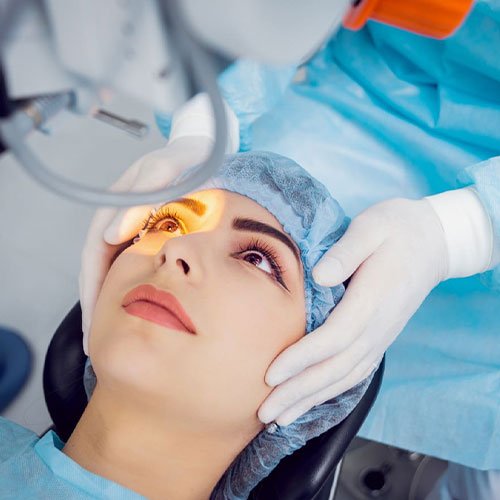Laser Surgery
Laser surgery is a precise and minimally invasive technique that uses focused light (lasers) to perform various medical and cosmetic procedures. Unlike traditional surgery, which involves manual incisions with scalpels, laser surgery employs specific wavelengths of light to target and treat tissues. This approach is highly controlled, allowing surgeons to focus on precise areas with minimal impact on surrounding tissues.
Overall, laser surgery is an innovative and powerful tool in modern medicine, providing precision and safety in treating a wide range of medical and cosmetic issues. It is continually evolving, with new advancements improving outcomes and expanding its applications.

Types of Laser Surgery
Laser surgery is used in a variety of fields, each with specialized laser types tailored to their needs. Major types include:
Ophthalmic Laser Surgery: This is commonly used for vision correction, such as LASIK (Laser-Assisted in Situ Keratomileusis). In LASIK, the laser reshapes the cornea to correct refractive errors, improving vision for conditions like myopia, hyperopia, and astigmatism.
Dermatological Laser Surgery: Lasers are widely used in dermatology for procedures like tattoo removal, scar reduction, and wrinkle treatment. Different lasers target specific skin layers, allowing for the treatment of various skin conditions with precision.
Oncological Laser Surgery: Laser surgery is sometimes used in oncology to target and destroy cancer cells in early stages, such as in certain types of cervical and lung cancers. The laser energy heats and destroys the cancerous cells with minimal damage to surrounding tissue.
Dental Laser Surgery: In dentistry, lasers are used for treating gum disease, tooth whitening, and other oral issues. The laser helps reduce bleeding, swelling, and pain, leading to faster recovery for patients.
Cosmetic Laser Surgery: Many cosmetic surgeries use lasers, including skin resurfacing, hair removal, and vascular treatments for varicose veins. These procedures generally require less recovery time and have lower risks of scarring.
Advantages of Laser Surgery
- Precision: Lasers allow for high precision, targeting only the desired tissue, minimizing collateral damage.
- Reduced Pain and Swelling: Since lasers are less invasive, they typically cause less pain, bleeding, and swelling compared to traditional methods.
- Shorter Recovery Time: Many laser procedures are outpatient, meaning patients can often go home the same day. This also generally results in shorter recovery times.
- Sterilization: Lasers can sterilize as they cut, reducing the risk of infections





